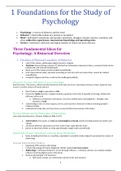1 Foundations for the Study of
Psychology
• Psychology = science of behavior and the mind
• behavior = observable actions of a person or an animal
• Mind = individual’s sensations, perceptions, memories, thoughts, dreams, motives, emotions, and
other subjective experiences, unconscious knowledge and operating rules
• Science = systematic collection and logical analysis of objectively observable data.
Three Fundamental Ideas for
Psychology: A Historical Overview
1. The Idea of Physical Causation of Behavior
• until 18th century, philosophy tightly bound to religion
• Dualism= human being consists of 2 distinct but intimately conjoined entities, a material body and an
immaterial soul (church maintained)
• Body, part of the natural world, studied scientifically
• soul, supernatural entity, operates according to own free will, not natural law, cannot be studied
scientifically
• accepted religious doctrine, could not be challenged publicly
Descartes’ Version of Dualism: Focus on the Body
René Descartes, 17th century, reflexes and the interaction of the body and soul in controlling voluntary actions, important step
toward a scientific analysis of human behavior
• Most Dualists: soul responsible for life
• Descrates: body intricate, complex machine, generates own heat & capable of moving, without the
influence of the soul
Þ Difference nonhuman and human: conscious deliberation and judgment = thought, only
function of soul
• acknowledges roles of sense organs, nerves, and muscles in behavior without violating people’s
religious beliefs
• nonmaterial entity (the soul) can have a material effect (movement of the body)
Thomas Hobbes and the Philosophy of Materialism
same time that Descartes, Thomas Hobbes (1588–1679)
• materialism= that spirit, or soul, is a meaningless concept and that nothing exists but matter and
energy
• all human behavior, physical processes in the body, especially the brain
• places no theoretical limit on what psychologists might study scientifically
Nineteenth-Century Physiology: Learning About the Machine
• body, including the brain, is a machine, amenable to scientific study, helped to promote the science of
physiology
Increased Understanding of Reflexes
• beginning 19th century, physiology
• French physiologist François Magendie (1822) studied nervous system
• Reflexology = all human behavior occurs through reflexes— voluntary actions are actually complex
reflexes involving higher parts of the brain
• Russian physiologist I. M. Sechenov :
Þ All human actions, are initiated by stimuli in the environment
1
,The Concept of Localization of Function in the Brain
• 19th century, physiology
• that specific parts of the brain serve specific functions in the production of mental experience and
behavior
Evidence about the relationships between mind and brain helped to lay the groundwork for a scientific
psychology because it gave substance to the idea of a material basis for mental processes.
2. The Idea That the Mind and Behavior Are Shaped by Experience
• Empiricism= human knowledge and thought derive ultimately from sensory experience
• Ability to learn
Þ senses -> input -> knowledge -> thinking -> adaptive behavior
The Empiricist Concept of Association by Contiguity
• thoughts reflections of a person’s experiences in the physical and social environment
• most basic operating principle law of association by contiguity (Aristotle 4th,century BCE )
• a fundamental principle of learning and memory
The Nativist Response to Empiricism
• opposite of empiricism is nativism = human knowledge and the basic operating characteristics of the
mind native to human mind(inborn & not acquired from experience)
• Kant distinguishes between:
Þ a priori knowledge = built into the human brain,not learned
Þ a posteriori knowledge = gained from experience in the environment
3. The Idea That the Machinery of Behavior and Mind Evolved Through Natural
Selection
• 1859, English naturalist Charles Darwin (1809–1882)
Natural Selection and the Analysis of the Functions of Behavior
• natural selection= living things evolve gradually, over generations
• Survival of the fittest = well adapted to local environment, more likely to survive and reproduce
• Variation = random changes in the hereditary material
• Function = through natural selection, living things have acquired tendencies to behave in ways that
promote their survival and reproduction
Application of Darwin’s Ideas to Psychology
• basic forms of human emotional expressions (ex. laughing and crying) inherited
• ability to communicate one’s emotions or intentions improves one’s chances of survival
• humans part of the natural world and can be understood through the methods of science
The Scope of Psychology
• Psychology is a vast and diverse field.
• explain mental experiences and behavior
= level of analysis
• complementary to one another, not as opposing poles of a philosophical argument
2
,Varieties of Explanations in Psychology and Their Application to Sexual Jealousy
• sexual jealousy = set of emotions and behaviors that result when a person believes that his or her
relationship with a sexual partner or potential sexual partner is threatened by the partner’s
involvement with another person
Explanations That Focus on Biological Processes
Neural Explanations
• products of the nervous system = behavioral neuroscience.
Physiological Explanations
• physiological psychology, or biopsychology
• hormones and drugs act on the brain to alter behavior and experience
Genetic Explanations
• Differences among individuals in the genes they inherit can cause differences in the brain and,
therefore, differences in mental experiences and behavior
• behavioral genetics
• identify specific genes that contribute to a trait by comparing the DNA (genetic material) of people
who differ in that trait
Evolutionary Explanations
• basic biological machinery underlying behavior and mental experience is a product of evolution by
natural selection
• evolutionary psychology
• actual routes by which particular behavioral capacities or tendencies evolved
Explanations That Focus on Environmental Experiences,
Knowledge, and Development
Learning Explanations
• all forms of human behavior and mental experience are modifiable by learning
• learning psychology or behavioral psychology.
• derive partly from differences in past experiences
Cognitive Explanations
• information in the mind (conscious&unconscious)
• behaviors we can observe
• mental information that underlie, basic processes by which learned information is stored and
organized in the mind, memory
• experience in the environment- > change in knowledge or beliefs -> change in behavior
• cognitive psychology
Social Explanations
• Human by nature, social animals in order to survive and reproduce
• Use others as models of how to behave
• identify how they are influenced by other people
• social psychology
• conformity to social norms, social pressure
3
, Cultural Explanations
• knowing about the culture in which that person grew up
• cultural psychology
• emphasize the immediate social influences that act on individuals, cultural psychologists strive to
characterize entire cultures in terms of the typical ways that people within them feel, think, and act
• unique history, economy, and religious or philosophical traditions of a culture to explain the values,
norms, and habits of its people
Developmental Explanations
• person’s age enables us to predict some as- pects of that person’s behavior
• developmental psychology
• processes that produce the age-related changes
• how experiences at any given stage of development can influence behavior at later stages
2 Methods of Psychology
Lessons from Clever Hans
• Mr. von Osten, horses as intelligent as people, if given a proper education
• able to answer practically any question
• Pfungst theorized, not through understanding but responding to visual signals inadvertently produced by
the questione
Facts, Theories, and Hypotheses
• fact, observation
Þ objective statement
• theory
Þ idea, or a conceptual model
Þ designed to explain existing facts and make predictions
• hypothesis
Þ prediction about new facts
• cycle of science Facts -> theories -> hypotheses -> tested with experiments or other research studies ->
new facts -> new theories …
The Lessons
1. The value of skepticism.
• Skeptics seek to disprove claims
• logical foundation of scientific testing
• the simpler the explanation , the better = parsimony, or Occam’s razor
2. The value of careful observations under controlled conditions
• tested Hans repeatedly, with and without blinders, and recorded the percentage of correct answers in each
condition
3. The problem of observer-expectancy effects
• unintentionally communicate to subjects
4





